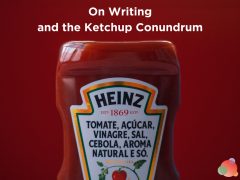 For Christmas last year, my in-laws gave me a subscription to Masterclass (thank you, in-laws!).
For Christmas last year, my in-laws gave me a subscription to Masterclass (thank you, in-laws!).
It started out with cooking classes, where I have learned many new tricks that have helped my kitchen evolution—and also some completely unrealistic tips.
Such as rotating your vegetables and your knife as you chop so you end up with perfect little dollops of color.
They’re absolutely gorgeous, but when you’re trying to get dinner on the table after work, no one really cares if their veggies are perfect little dollops.
I’ve also learned a few things about chefs.
Thomas Keller, though one of the most brilliants chefs in the world, is horribly boring to watch.
He’s also a perfectionist (hence, perfect dollops of veggies), which makes it incredibly hard to recreate in your own kitchen.
Not that I’m not up to the challenge, but no one cares about perfect dollops of veggies when your kid is having a meltdown because she’s hungry.
Wolfgang Puck, on the other hand, provides entertaining and useful instruction even though he eats off the spoon and puts it back in whatever it is he’s cooking.
(People FREAK OUT about this in the comments. I find it rather endearing. It’s not like I’m eating in his home. I’m positive he doesn’t do it in his restaurants.)
All-in-all, I love my Masterclass subscription and highly recommend them.
You can have instruction on everything from cooking and basketball to photography and writing.
It, however, has taken a back seat this summer. I tend not to cook as much in the summertime, plus I’ve been deep into our agency owner program.
It’s been all content, all the time and my brain hasn’t had room for extra learning.
What Does Ketchup Have to Do With Writing?
And then they launched a writing class with Malcolm Gladwell, and suddenly my brain had extra room.
I’m only a couple of lessons in—which means this won’t be the last time you hear about it—but I’ve already learned a great deal.
There is a story he tells about ketchup, which I will paraphrase, but know you can get the full story, complete with color, on Masterclass.
He says he was doing some research into the grocery industry and came to realize that ketchup is the only condiment in the grocery aisles that doesn’t have iterations of it.
Vinegar has lots of different kinds. Mustard, too. Pickles and relish. Olive oil.
Everything has different flavors. Different extensions. Different iterations.
Except ketchup.
You pretty much just have Heinz (and the knock-offs).
People have tried to make other kinds of ketchup, to no avail.
So he sets out to figure out why this is—and interviews spaghetti sauce and horizontal segmentation expert, Howard Moskowitz.
As it turns out, he learns a great deal about the grocery store aisles, but never solves the ketchup conundrum.
But he still writes the story—in 2004 for The New Yorker.
He starts it out by saying there is this interesting thing about ketchup, and then delves deep into Moskowitz (3,000 words deep), and comes back at the end to say, “I guess ketchup is just ketchup.”
It’s Like an Unfinished Puzzle
What does this have to do with writing, pray tell?
It’s a cool story, in and of itself, but when you apply it to writing, it becomes incredibly appealing.
You see, it’s a puzzle where everything comes together nicely, except that one little bit.
We still don’t know why there aren’t ketchup line extensions, like there are for pasta sauce and mayo and soda pop.
But that’s what makes the writing compelling—and why we remember the story.
It’s a puzzle we haven’t been able to figure out, so our brains keep going back to it, time and again.
There is one piece missing and, just like with a puzzle when there is a piece missing, it sort of drives you crazy.
His challenge, then, is to write like a puzzle.
Most of your article or story or piece fits together like it should, but there’s one piece that just doesn’t quite fit.
It’s close.
Maybe it has the same edges as to what fits in that spot, but it’s just a tiny bit off.
Kind of like the ketchup conundrum.
What if Ketchup is Just Ketchup?
We spend so much of our time with storytelling—and in making sure our content is compelling enough that it stands out in the sea of mediocrity.
And we’re taught that in writing, everything needs to fit together nicely.
There has to be a happy ending—or at least an ending—and the story needs to be packaged with a pretty ribbon tying it all together.
But what if you don’t tie it all together nicely at the end?
How does your story or your article or your thing end?
Can you develop something that is like a puzzle—it’s missing just one little tiny piece?
It’s not easy, but it’s an interesting way to look at how you write—how you develop a piece of content.
So that is my challenge to you this week.
Read the aforementioned The New Yorker story about ketchup, and then try it with your own content marketing.
Create a puzzle that you solve except for one tiny thing. See what happens. And report back. I’d love to know how your experiment goes.
And keep this in mind while you create: what if ketchup is just ketchup?
Photo by Pedro Ribeiro on Unsplash